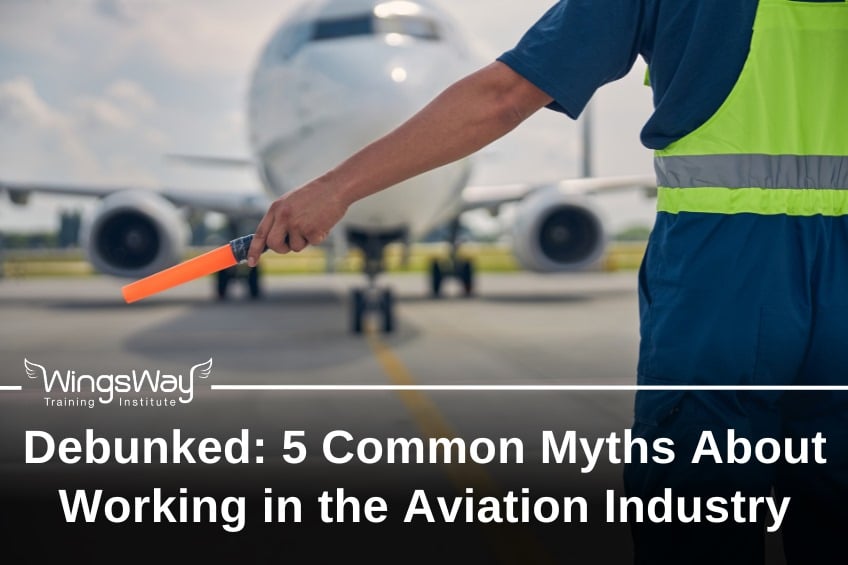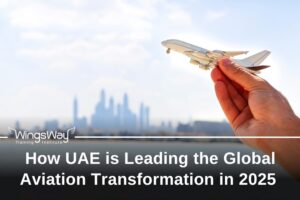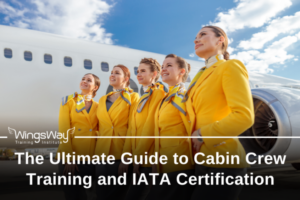
Debunked: 5 Common Myths About Working in the Aviation Industry
The aviation industry has long captivated imaginations, offering an environment filled with adventure, advanced technology, and a global impact. Whether it’s flying high above the clouds or working on the ground, the industry offers diverse career opportunities. However, it’s also surrounded by several myths that often prevent people from considering it as a viable career path. These misconceptions about the work involved in aviation can deter aspiring professionals from exploring their potential in the field.
In this blog post, we’ll debunk five of the most common aviation myths, shedding light on the reality and providing insight into the many fulfilling opportunities the industry has to offer.
Top 5 Aviation Myths
Aviation Myth #1: You Need to be a Pilot to Work in Aviation
The Truth: While pilots often receive the most attention in the aviation industry, they are far from the only professionals important to the success of the sector. In fact, the aviation field is vast and encompasses a wide range of roles, many of which don’t involve flying or being in an aircraft.
The aviation industry relies on skilled workers from many disciplines, from engineering and technology to logistics, customer service, and management. Some of the critical roles in aviation include air traffic controllers, ground crew, airport security, airline operations managers, and maintenance personnel. In 2023, approximately 87 million jobs globally were linked to the aviation industry, with the majority of them being non-pilot positions.
For instance, aviation mechanics are indispensable to ensuring the safety and functionality of aircraft and conducting routine maintenance and repairs. Similarly, air traffic controllers play a vital role in coordinating and managing the flow of air traffic, making sure that thousands of flights safely navigate airspace around the world.
Moreover, with the increasing reliance on digital systems in aviation, there is a growing demand for professionals in areas like aviation software development, cybersecurity, and data analytics, which don’t require piloting skills.
Recent Example: The COVID-19 pandemic highlighted the versatility of aviation careers. When passenger traffic plummeted, many aviation professionals, including logistics coordinators and engineers, adapted to the new demand for cargo transport. FedEx, for example, continued to rely heavily on aviation specialists from various fields to support the shipping of essential goods, despite fewer passenger flights in the air.
Aviation Myth #2: The Aviation Industry is Only for Young People
The Truth: It’s a common misconception that aviation is a young person’s industry, particularly when people think of pilots or flight attendants. While pilots do have a mandatory retirement age of around 65, the aviation industry offers ample opportunities for workers of all ages, with many positions that don’t have age restrictions.
Ageing professionals often find roles in aviation that are fulfilling and provide opportunities to contribute their experience. For instance, safety inspectors, air traffic controllers, and aviation managers can often continue working into their later years, bringing decades of wisdom and knowledge to their roles.
In fact, many people start careers in aviation later in life after transitioning from other industries. Whether it’s an engineer with experience in manufacturing looking to move into aircraft maintenance or someone with a background in customer service who wants to work as an airline operations manager, the aviation industry is full of opportunities for career changers.
Additionally, with the rise of remote work in the aviation sector, many experienced professionals are finding flexible opportunities in training, consultancy, or management roles.
Recent Example: A notable trend in aviation is the growing demand for remote jobs in flight training and aviation consultancy. Experienced professionals—such as retired pilots, engineers, and safety experts—are increasingly sought after for their deep expertise, often taking on consulting roles or freelance positions where they share their knowledge with airlines or flight schools around the world.
Aviation Myth #3: Working in Aviation Means You’ll Always Be Away from Home
The Truth: One of the most enduring aviation myths about aviation careers is the idea that those who work in the field are constantly away from home, never having a chance to enjoy a regular life. While it’s true that pilots and flight attendants spend a significant amount of time travelling, not all aviation roles require frequent travel and many positions offer stable work-life balance.
In fact, airport staff, ground crew, maintenance teams, and aviation management professionals often work regular hours and have weekends and holidays off. Many of these roles require specific shifts, but they don’t necessarily involve long trips away from home. This is especially true in technical or safety-related roles where professionals focus on maintaining the operational side of the aviation process.
In recent years, the aviation industry has also embraced more flexible working arrangements. Remote work is becoming increasingly common for positions in areas like aviation management, marketing, customer service, and digital services.
Recent Example: In response to feedback from their employees, Delta Air Lines implemented a new initiative to offer more flexible scheduling for their pilots and flight attendants in 2021. This included more predictable schedules with longer breaks between flights, which allowed employees to plan personal time off and enjoy more time at home. This shift marked a significant change in how airlines are handling crew work-life balance, reflecting the broader push toward better schedules and flexibility in the aviation workforce.
Aviation Myth #4: Aviation Jobs are Highly Dangerous
The Truth: Safety in the aviation industry is a top priority, and strict safety protocols ensure that the risk of accidents or injury is minimal. In fact, aviation is one of the safest modes of transportation, thanks to technological advancements, regular maintenance checks, and the extensive training of employees at all levels.
While it’s true that aviation involves inherent risks (as does any industry), the strict regulations enforced by aviation authorities such as the Federal Aviation Administration (FAA), European Union Aviation Safety Agency (EASA), and International Civil Aviation Organization (ICAO) are designed to minimise risks as much as possible. From routine maintenance of aircraft to detailed air traffic control procedures, the aviation industry invests significantly in safety measures. Additionally, pilots and flight crew undergo rigorous training and continual assessments to ensure they are ready for any situation that might arise.
Ground crew and maintenance workers are also trained extensively in safety procedures, from handling hazardous materials to responding to emergency situations. Furthermore, air traffic controllers work with advanced radar and communication systems to manage the flow of air traffic, and the technology supporting their efforts is continually improving.
Recent Example: In 2022, the aviation industry reached a record-low accident rate, with serious incidents becoming increasingly rare. This can be attributed to improvements in flight management systems, the widespread use of digital technologies in air traffic control, and enhanced safety protocols implemented by airlines and airports globally.
Aviation Myth #5: The Aviation Industry is Only for Highly Specialised Engineers or Technicians
The Truth: While engineering and technical skills are highly valued in aviation, the industry is not limited to these roles. In fact, aviation is a highly dynamic and multifaceted field that requires professionals from a wide variety of backgrounds, including business, law, marketing, customer service, finance, and even hospitality.
Airlines, airports, and aviation companies are constantly looking for individuals who can contribute to areas like strategic planning, human resources, legal compliance, customer service, and even data analysis. As technological advancements in aviation continue to happen, the demand for digital professionals—such as cybersecurity experts, software developers, and data analysts—has skyrocketed. Additionally, aviation management professionals with a solid understanding of business operations and economics play a critical role in shaping the future of the industry.
For example, airlines today need marketing professionals who can craft compelling travel experiences and build brand loyalty, legal experts who understand aviation regulations, and finance specialists who can optimize airline operations to ensure profitability.
Recent Example: The digital transformation in the aviation sector has created exciting new roles for people with backgrounds in technology and data science. Airlines like Lufthansa and JetBlue have significantly expanded their digital teams to focus on enhancing passenger experiences, optimising flight operations, and safeguarding against cybersecurity threats. These companies are increasingly looking for data scientists, software engineers, and IT professionals to help drive innovation and improve efficiency.
Let the Truth Set You Free
The aviation industry offers a wide array of career paths, far beyond the conventional image of pilots and flight attendants. From safety officers to cybersecurity experts, from maintenance technicians to business strategists, the aviation sector is teeming with opportunities for people with diverse skills, experiences, and backgrounds. By debunking these common misconceptions about aviation, we can see that the industry is dynamic, growing, welcoming, and truly has something to offer to everyone.
So, if you’re considering a career in aviation, don’t be limited by outdated stereotypes. The aviation industry has lots to offer to professionals from all walks of life, and your skill set could be the perfect fit for an exciting and rewarding role in the skies.
How WingsWay Can Help
WingsWay Training Institute is one of the premier institutes in Dubai offering hands-on training to aviation professionals. Our IATA-certified courses can help debunk such myths, upskill aviation professionals with the latest industry knowledge, and open up their job avenues internationally.
Whether you’re aiming to work in airports, airlines, or travel and tourism, WingsWay ensures you’re equipped with the tools and expertise to succeed. Our comprehensive programs cover safety protocols, digital technologies, and more, preparing you for any role in the aviation industry.
Discover the diverse opportunities in aviation with WingsWay Training Institute. Contact us today to learn more about our courses and take the first step towards an exciting career in the skies.



